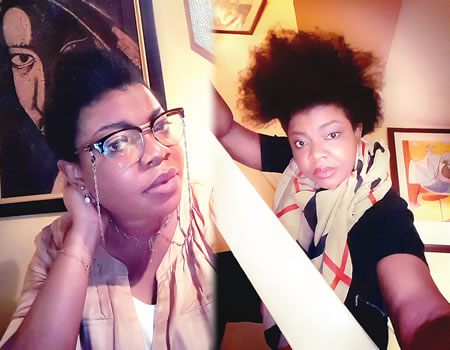Samantha-Israel Iwowo is an award-winning film maker, brand-communications strategist and TV-content creator. She holds a Bachelors of Arts (BA) in English Literature from the University of Benin, a Diploma in Film Directing from London Academy of Media, Film & TV, and a Masters Degree in Corporate Communications and PR from the University of West London. She is currently pursuing a Ph.D in Film and Television at the University of Bristol, England. In this interview by TAYO GESINDE, the writer of the award-winning movie Olobiri shares her story.
Growing up
My two sisters and I were raised in Benin City by our mum. Our father died when I was six months old. He was the Commissioner for Social-Development, Youth and Culture in what used to be Bendel State. I attended St. Maria Girls Grammar School, graduating in 1998 and commencing my university education in the same year.
My choice of career
I reckon that interest and guidance played huge roles. I have always had a liking for well-worded lines and how lyrical they sound. I think this led me towards poetry. I was profoundly interested in poems while in secondary school; I had a lesson teacher, Mr. Kingsley, God bless him. He taught me to memorise the A to Z of literary terms – alliteration to zigma. He would say if I could learn them, I was on my way to owning a fine writing style; and I did try to learn them. They were about 72 in number, in the booklet he availed me. At this time, though, I still wasn’t sure what I wanted to read at university, until my immediate elder sister, Juanetta, convinced me to study English and Literature. These would be the most crucial foundations of my career today and my current Ph.D research-study in Film.
When I got into the university, I learnt poetry in greater detail, in addition to prose writing and grammar. Then I dared to write my first poem. Thereafter, more followed. After university, I worked as an intern with Vanguard Allure Nigeria for a few months, writing on fashion topics. Later on in England, I had some informal interactions with filmmaking processes. I liked it and so once I submitted my Masters Degree dissertation, I decided to formally learn about filmmaking. I went for a Diploma in Screenwriting and Directing and the implications of this would be my Ph.D research, and filmmaking career.
My role models
They abound. My mother, surely, foremost. My mum’s best friend, Barrister Victoria Okonyia. I also have been greatly impacted by several people. My direct writing influences are the author, Mrs. Helen Oviaghele; the thespian, Taiwo Ajai-Lycett and Professor Nduka Otiono. Works of writers like Chinua Achebe, Maya Angelou, Toni Morrison, Chimamanda Adichie, Helon Habila, have been helpful. Screenwritings of Mario Puzo, Shonda Rhimes, Euzhan Palcy, Woody Allen, Dalton Trumbo, Francis Coppola, Dalton Trumbo, and Orson Welles have assisted me too.
How I get inspiration for my stories
Praying and meditating; reading post-colonialism writings of Homi Bhabha, Frantz Fanon and the likes; I am also inspired by observing human, socio-cultural, political proclivities and the dynamics of all these.
The journey so far
It has been interesting. I have had a lot of help along the way — Divine and human. I have had a lot of mentoring too. In turn, I attempt to help. I am learning that what you give comes back to you; when you get, you ought to give and when you learn, you ought to teach.
Challenges faced while working on the award-winning movie, Oloibiri.
I would say it is the emotions I sometimes lived through during the process of writing the narrative, right after observing the horrid realities of life in Niger-Delta villages. The people appear to have resigned themselves to their fates and the thought of this, I sometimes found overwhelming.
On the paper I presented at Oxford University RAD 2017 Conference
The paper was about the realities of Nollywood transnationalism. In other words, it was about the existing realities in the increasing international collaborations between Nollywood and the West. I attempted to talk about what these appear to signify for the industry. It entailed highlighting some benefits of these realities to Nollywood’s sustenance and expansion, as well as what the cultural implications of international production partnerships are. Afterwards came quite an interactive discussion. Two other Nigerian Ph.D students also presented at this conference. It is elating to see that they are quite a number of us in active academic research. It reassures me that in my generation, regardless of the decadence, there are a lot of persons who value knowledge. I do agree that Nigeria’s greatest asset is her human resources.
Assessment of the Nigerian movie industry
In many areas Nollywood has done significantly well: creating jobs, sustaining dreams, birthing icons, aiding the country’s economy, availing the country a voice with which to tell its stories and reinforce its cultures. Most of these things this industry has done extensively unaided by government funding until the Goodluck-Jonathan-led administration. There remain, however, significant grounds for Nollywood to glean in the areas of better quality screenwriting and camera-techniques, and as I see it, there are currently steps in this worthwhile direction.
On the rate at which movies are churned out on a daily basis and how to fight piracy in Nollywood
Regarding the churning out of movies on a daily basis, I observe it is the inherent nature of this industry. I do think that cannot – and should not – be stopped because it is actually the machine that keeps Nollywood active. Indeed, though, as I just pointed out, quality-improvement is utterly important; it will be good for filmmakers to strive some more towards it. This industry which keeps a lot of people employed might soon be the largest employer of labour in Nigeria I do not know. One thing apparent is that the daily churn out of movies is instructive that there is an audience for them. On the issue of piracy, the anti-piracy laws must be constantly, sincerely and proactively enforced. Much of it is informed by the culture of impunity. You see, Nigeria is a country plagued by a legion of sacred cows.
Combining your career with the home front
I do strive to keep in view the times for work and for family. I admit, finding this balance requires constant, conscious effort.
Most defining moment of my career so far
I think they are few: the most profound was deciding to register for my Ph.D study in filmmaking, that decision would permanently change how I see screen-stories. I think another would be when I presented a paper on Nollywood, at the Research Africa Day Conference at the University of Oxford. I felt a sense of fulfillment telling academics of different cultural orientations about a film industry in West Africa largely borne of defiance to hegemonic Western filmmaking costs. Then, also, in February this year, the Library of the Academy of Motion Picture Arts & Science, Hollywood, requested for a copy of the Oloibiri screenplay to be archived amongst its Core Collection. Established in 1928, this library functions as the central repository of the Academy (or OSCARS) Awards. It was overwhelming to realise that the screenplay had been considered worthy of filing by this prestigious film-research library.
Advice for young women
Respect yourself. Try your best every time, and should you make mistakes, you owe it to yourself to learn from it – and forgive yourself and forge ahead.






